Lance Larsen and Karen Rosenbaum were awarded 2014 Association for Mormon Letters Honorary Lifetime Membership Awards. Below are the citations written by members of the AML Awards Committee and selected bibliographies.
Lance Larsen
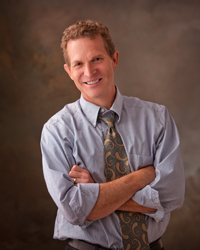 Mormon theology demands that in all we do—language-making included—we attend closely to the environment(s) we inhabit. “Consider the lilies of the field,” Christ said in the Sermon on the Mount, then again in his sermon at the Nephite temple and to Joseph Smith in Kirtland. His utterance, reiterated across nations and dispensations, calls his disciples to rely on his grace as they seek to build Zion: “You’re worried about where you’ll get your next meal?” he asks. “How you’ll quench your thirst and clothe your nakedness? Well, look closely at the lilies. See how their relationship with the earth sustains their growth? They root in rich soil. They withhold their presence and their beauty from no one. They consume only as their needs demand and what they produce—even in death—contributes to the health and constant renewal of their environment, to which the species readily adapts. Can human institutions, which are prone to excess, say the same of themselves?
Mormon theology demands that in all we do—language-making included—we attend closely to the environment(s) we inhabit. “Consider the lilies of the field,” Christ said in the Sermon on the Mount, then again in his sermon at the Nephite temple and to Joseph Smith in Kirtland. His utterance, reiterated across nations and dispensations, calls his disciples to rely on his grace as they seek to build Zion: “You’re worried about where you’ll get your next meal?” he asks. “How you’ll quench your thirst and clothe your nakedness? Well, look closely at the lilies. See how their relationship with the earth sustains their growth? They root in rich soil. They withhold their presence and their beauty from no one. They consume only as their needs demand and what they produce—even in death—contributes to the health and constant renewal of their environment, to which the species readily adapts. Can human institutions, which are prone to excess, say the same of themselves?
“Live, rather, like the lilies.”
Lance Larsen takes this imperative seriously. As a nationally-recognized poet, an advocate for literature and the arts, and a teacher, he encourages others to fall in love with the world and to attend closely to its inhabitants, its products, and its processes. His four poetry collections all take this as a primary concern and as Utah’s Poet Laureate he shares his vision with communities around the state and seeks to raise awareness about how literature and the arts can help us be fully present in the world. And although Larsen has, as BYU professor Gideon Burton notes, “consciously avoided LDS publishing venues” on his quest to target a national audience, instead placing his poems in a wide-range of distinguished mainstream journals, he has not, as Burton continues, “avoided populating his poetry with Mormon figures, scenarios, and themes. The result is a [corpus] of poetry that avoids parochialism while simultaneously reflecting [his] deep roots in family, religion, the tangibility of God’s creation, and a believer’s experience within it.”
During his tenure as professor of English at BYU, Larsen has mentored many students from this position of awareness of and commitment to place, teaching them to attend closely to the world, to take their craft seriously, and to ground themselves in the everyday work of sustaining meaningful connections with people, communities, and institutions. This translates into having his students read widely and deeply, a process that exposes them to different perspectives on the world as well as to diverse models of good writing and that as such encourages their development as empathetic human beings and as competent writers. It has also translated into directing study-abroad programs that bring students into contact with places they may have only engaged in stories and that encourage deeper considerations about our diverse and increasingly interconnected world.
As a devoted poet and teacher, Larsen deserves recognition as someone who has made it his business and mission—in the classroom, his community, and the world—to advocate for such awareness of and engagement with the places we inhabit together.
(Bio taken from his Utah Poet Laureate page.) He holds a B.A. and M.A. in English from Brigham Young University, and a PhD from the University of Houston. His work appears widely, in such venues as Georgia Review, Southern Review, Ploughshares, Poetry, River Styx, Orion, The Pushcart Prize Anthology, Best American Poetry 2009, Poetry Daily, and elsewhere. His nonfiction has twice made the Notable Essay list in Best American Essays. He is currently working on Seventeen Ways to Float, a collection of essays about place, family, and memory which won 1st place in the 2011 Utah Original Writing Competition. He grew up in Idaho and Colorado and lived in Chile for two years while serving an LDS mission. He collects antiques, plays basketball, occasionally walks on his hands, grows daylilies, hikes, and loves Indian and Thai food. He sometimes collaborates with his wife, Jacqui Biggs Larsen, a painter and multi-media artist. Since 1993 he has taught literature and creative writing at BYU, where he currently serves as associate chair. He and Jacqui recently directed a study abroad program in Madrid. In 2012, he was named to a five-year term as Utah Poet Laureate.
Poetry Collections
Erasable Walls. New Issues, 1998.
In All Their Animal Brilliance. University of Tampa Press, 2005. 2005 AML Poetry Award.
Backyard Alchemy. University of Tampa Press, 2009. 2009 AML Poetry Award.
Genius Loci. University of Tampa Press, 2014. 2014 AML Poetry Award finalist.
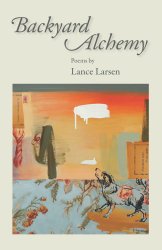
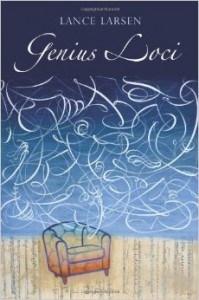
Karen Rosenbaum
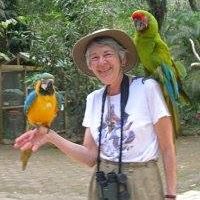 Karen Rosenbaum has dedicated herself to Mormon letters since its renaissance in the 1960s. A friend of Eugene England’s, she was hired to manage the office (after a manner, she claims, only she could understand) of the fledgling journal Dialogue. She was also invited to publish her own fiction in the journal, becoming the second fictionist published in its pages and helping to set a standard for excellence she furthered as Dialogue‘s fiction editor from 2004 to 2008. Karen’s support in sweat, art, and finance has benefitted both Dialogue and Sunstone for decades. She has long been a regular feature in the pages of both (as well as Irreantum) and has long been a frequent contributor at Sunstone symposia.
Karen Rosenbaum has dedicated herself to Mormon letters since its renaissance in the 1960s. A friend of Eugene England’s, she was hired to manage the office (after a manner, she claims, only she could understand) of the fledgling journal Dialogue. She was also invited to publish her own fiction in the journal, becoming the second fictionist published in its pages and helping to set a standard for excellence she furthered as Dialogue‘s fiction editor from 2004 to 2008. Karen’s support in sweat, art, and finance has benefitted both Dialogue and Sunstone for decades. She has long been a regular feature in the pages of both (as well as Irreantum) and has long been a frequent contributor at Sunstone symposia.
As a student, at the University of Utah and Stanford University, Karen studied under writers with a Mormon understanding: Wallace Stegner and Richard Scowcroft—both of whom had strong connections with the faith but who, respectively, were glad to not to have been born Mormon and glad to have gotten away. She learned from them, but their influence also created in her a desire to prove that a Mormon literature could have both excellence and broad appeal.
From 1967-2001 Karen was a professor of English at Ohlone Community College in a small college in Fremont, California, where she dedicated the bulk of her energies to improving the work of her students, while still contributing excellently crafted work to Mormon letters.
Karen was always willing to travel new roads. She took on the teaching of science fiction at the request of her students—a genre she had been unfamiliar with but would become expert in, including early close readings of LDS writers who would soon saturate the field. And in 2011 she went from mere awareness of Wikipedia to preparing a comprehensive presentation at Sunstone on its Mormon literary content.
Karen remains as vital and forward-looking today as she’s ever been. Her example of quiet steadfastness has inspired many younger writers. Without flash or self-promotion, Karen has built one of the strongest personal catalogues of short fiction, personal essay, and criticism in Mormon letters. Her willingness to support the field with her time, her effort, and her resources has saved more than one project from oblivion.
Partial bibliography
Short Stories:
“The Mustard Seed.” In Stanford Short Stories 1964, edited by Wallace Stenger and Richard Scowcroft, 1964
“The Princess of the Pumpkin”. Dialogue, 2:3, Autumn 1967. The second short story ever published in Dialogue. Discussed here.
“Morning”. Sunstone 2, Spring 1976.
“The Joys of Mormonish” Exponent II 3:4, June 1977.
“Hit the Frolicking, Rippling Brooks.” Dialogue 11:3, Autumn 1978. 1979 AML Short Fiction Honorable Mention. Republished in Bright Angels and Familiars, 1992. Discussed here.
“Low Tide.” Sunstone, 5:5, Sept-Oct 1980. Republished in Greening Wheat: Fifteen Mormon Short Stories. ed. by Levi Peterson, Orion, 1983. Eugene England said it “provides harrowing confrontations with ‘the possibility of moving from the security of religious faith and reliance on grace to the honest but terrifying faith that the universe is ultimately meaningless and death truly ultimate.”
“Sign Me A Shower”. Exponent II, 7:2. 1981.
“Here We Go Round The Block”. Exponent II, 8:3, Spring 1982.
“After the Flood . . . Me” Sunstone. 8:4, July-Aug. 1983. Sunstone 1983 Fiction Contest, 3rd place.
“Long Divisions”. Dialogue, 20:3, Fall 1987. Dialogue 1987 short story contest first place.
“One on the Aisle,” Dialogue, 26: 1, Spring 1993.
“Burial Places”. Exponent II, 21:1, Fall 1997.
“Reading Between the Sheets” Dialogue 31.1, Spring 1998.
“Immersions” Exponent II 23.2, 2000
“Balm”. Kalliope: A Journal of Women’s Arts and Literature, 23:1, 2001.
“Habits.” Irreantum, 4:1, Spring 2002. AKA “Price”. Irreantum 2001 contest third place. Citation: “This story explores the Mormon culture from what some would call off center. In this story you have faithful Mormon women who have not married faithful Mormon men. ‘Price’ explores, among other things, happiness and how it can exist where some may think it shouldn’t.”
“Out of the Woods”. Dialogue 35.1, Spring 2002. 2002 AML Short Fiction honorable mention. Republished in Dispensation, Angela Hallstrom, ed. Zarahemla Books, 2010.
“Havesu”. Dialogue 36:2, Summer 2003.
“Sally Didn’t Sleep Here”. Dialogue 36:3, Fall 2003. A Mormon mother with insomnia thinks about her family.
“Unfinished Prayers,” In Proving Contraries: A Collection of Writings in Honor of Eugene England. Robert Rees, ed. Signature, 2005. Short story in a festschrift honoring Eugene England. The central character, Wren, a student at Stanford University, deals with the unpleasantness of life and its “big questions,” matters of faith and love.
“Aunt Charlotte’s Secrets”. Irreantum. 13:1, Spring/Summer 2011. 2010 Irreantum Fiction Contest 3rd place.
“Requiem in L Minor”. Dialogue 45:1, Spring 2012.
“Active Distress, Intensive Care”. Dialogue 47:1, Spring 2014. Discussed here.
Dialogue Fiction Editor, 2004-2009.
Essays:
“For Now I See Through a Glass Darkly.” In Mormon Women Speak: A Collection of Essays. Olympus 1982.
“For Meg—With Doubt and Faith.” Dialogue 24:2, Summer 1991. 1991 Dialouge Writing Award Winner, Personal Essay. A tribute to the poet Margaret Rampton Munk, who passed away in 1986.
“Wallace Stenger: The Unwritten Letter”. Dialogue 28:1, Spring 1995. About Rosenbaum’s interactions with Stenger and Scowcraft, being a Mormon graduate student at Stanford.
“Remembrances of Things Never Really Past: Gene at Stanford”. c. 2002.
“Boulder City: A Safe Place”. 2006.
“Pocketful of Guilt”. The Monthly, June 2010. “To give or to withhold? There’s no easy answer, it seems, to this age-old dilemma pondered by sages, Miss Manners, and pretty much everyone who braves the streets of downtown Berkeley.”
“Bee Farm”. Exponent II, 30:2, Fall 2010.
“How Frail a Foundation”, In Why I Stay: The Challenges of Discipleship for Contemporary Mormons, Robert Rees, ed. Signature, 2011.
“Darn It”. Exponent II. 33:3, Winter 2014. About darning socks.
Profile published in the Sierra Club Yodeler.

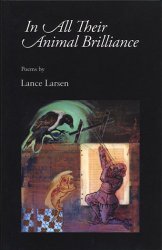
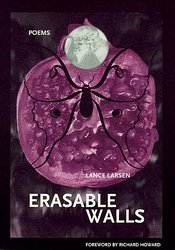
This former student of Lance Larsen’s agrees with the above assessment. A poet for his people and for people everywhere. Lance was the single most lucid and influential poetry teacher I ever had.